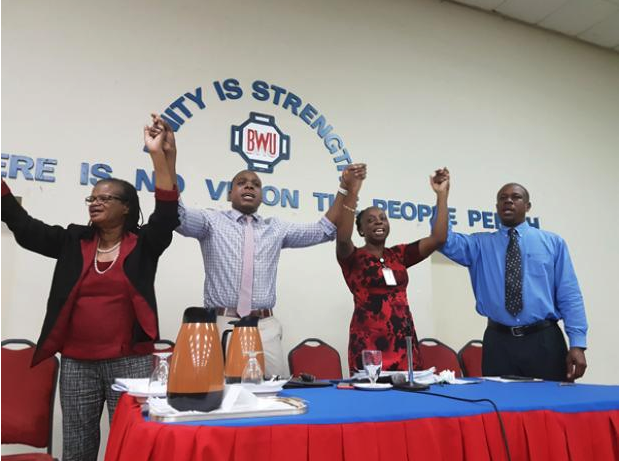On July 24, 2017, just two days shy of the 80th anniversary of the July 26, 1937 riots in Barbados, a nationwide protest called by trade unions and the private sector saw thousands of Barbadians marching against the then Democratic Labour Party administration.
It was an unprecedented and historic display of unity between the trade union movement and the private sector. At the helm, the Barbados Private Sector Association (BPSA), the Barbados Workers’ Union (BWU), the National Union of Public Workers (NUPW), the Barbados Union of Teachers (BUT) and the Barbados Secondary Teachers’ Union (BSTU).
Their collective beef, as stated by all the union leaders at the time, was the National Social Responsibility Levy (NSRL) tax which they described as “unfair” and “unjust”.
However, union leaders had also stated other concerns with the Freundel Stuart Government. Among the contentious issues were:
· Lack of engagement by the Government
· No consultation with the Social Partnership
· No increase in salaries for public servants
· High cost of living
On the day of the march, then leader of the NUPW Akanni McDowall said: “I am telling you today that we have to stand in solidarity if we expect this Government to do what we want. If you expect to get salary increases, you have to stand in solidarity.”
Many speculated that the 2017 march that saw labour and the business sector team up was about more than the NSRL.
To this day, there is still divide on the tax, with some bitterly against it and others who have suggested it was no worst off than any other tax.
In fact, in 2019, a local credit union pointed out that the removal of the NSRL had not resulted in lower prices to consumers in Barbados.
In a report carried in the Barbados Advocate, the Board of Directors of the Light and Power Employees’ Cooperative Credit Union Limited said as much, while discussing the prevailing economic conditions and their impact on the credit union’s members. “The much-celebrated repeal of the NSRL did not add much in the way of relieving consumer anxiety, as its removal did not have the anticipated outcome of abating the rising prices of consumables,” said the Board at the time. We all can agree.
On Tuesday, therefore, it came as a bit of a surprise to hear Prime Minister Mia Mottley say that the current strike among nurses of the Unity Workers Union (UWU) was not only about the Safe Zones but many other issues, as if to suggest that has not happened before.
The PM berated the Unity Workers’ Union (UWU) leader Senator Caswell Franklyn and accuse him of using the strike action as a political ploy in what she described as the “silly season”.
Interestingly, the same accusation was laid at her feet when she addressed the said 2017 labour and private sector march. She was Opposition Leader then as Franklyn is an Opposition Senator now. Anytime a politician is involved in a public issue, it becomes political by definition.
Ironically, 24 hours after the PM accused Senator Franklyn of playing politics, general secretary of the Barbados Labour Party Senator The Most Honourable Dr Jerome Walcott issued a challenge to the Opposition and the DLP to state their positions on the ongoing national issue.
He said: “The Barbados Labour Party is therefore moved to call on Bishop Atherley as we are indeed calling on the current president of the Democratic Labour Party Verla DePeiza to break their silence on this matter and let the public of Barbados understand where they stand on this most unfortunate situation.”
This begs the question: is it politics or not?
Indeed, what is in question is whether Senator Caswell followed established industrial procedures. The two sides strongly differ and hence the political lines have been drawn.
The grievances of nurses are well known to every administration that has governed over the past 30 years. The pandemic has compounded these issues as well. Political grandstanding on either side of the aisle is not the answer. Level heads must prevail and a return to the negotiating table is in the country’s best interest.
And therein lies the role of social partnership, rather than members lining up to distance themselves from one side in the dispute, now is the time to persuade the disputing parties to drop their axes and talk.
Senator Franklyn, who no doubt is well versed in industrial relations, must put the interests of his members first and sit down with the Government, put all genuine issues on the table and set realistic timelines to settle these long-standing issues that cannot be resolved in one or two round of talks. This country needs its nurses at this critical time.
Equally, the Government must recognise that its decision to dock the pay of the frontline workers, though grounded in legislation, is a harsh move for worn out nurses who have delivered yeoman service, especially over the last 20 months. The action which will only fuel tempers and further angst should therefore be withdrawn in the spirit of good negotiations. The issues need to be resolved.
Enough then of the politics, the drama and the blame game.
The country is watching and waiting for a speedy resolution.




